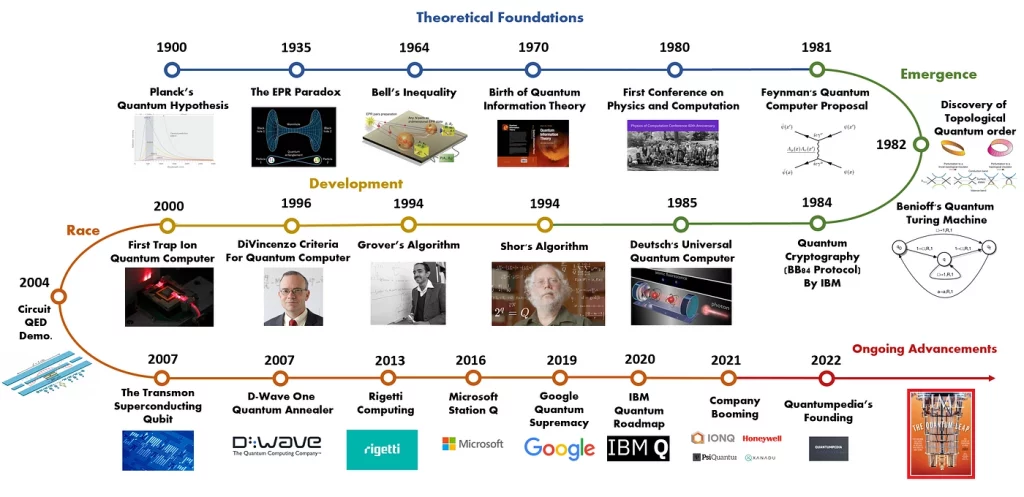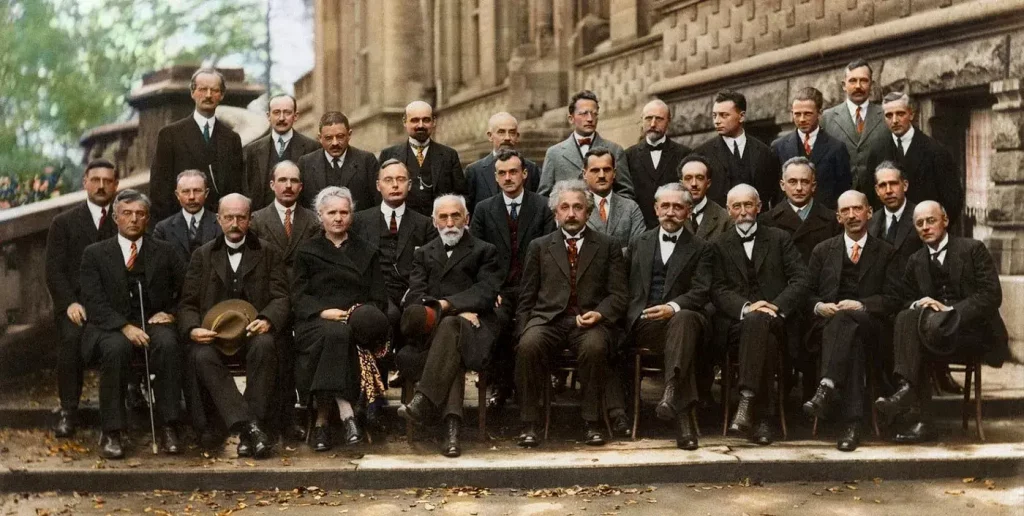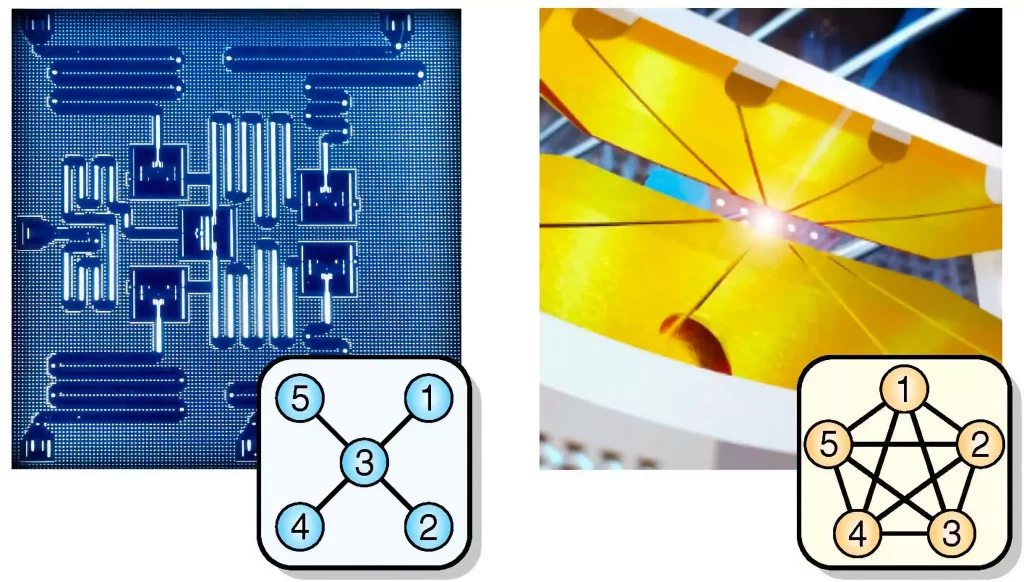Current State of Quantum Computing: A Journey into the Future
Quantum computing is undoubtedly an exciting frontier for any scientist, researcher, or technologist. This revolutionary domain applies the basic principles of quantum mechanics to the calculation beyond classical capabilities and problem-solving. Quantum computing ushers in a new paradigm in information processing and possibly unleashes unparalleled computational powers, catalyzing unparalleled developments across several spheres of life.
This paper will be an enlightenment journey- an exposition of the present status of quantum computing and the far-reaching ramifications of the future. History, evolution, the current landscape, and peering into exciting possibilities ahead, we delve into the rich history of this technology. Prepare to be mesmerized by its incredible potential to reshape our understanding of computation.
Table of Contents
History and Evolution of Quantum Computing

The origins of quantum computing can be traced back to the pioneering work of renowned physicists and mathematicians in the early 20th century. Their groundbreaking discoveries and theories laid the foundation for this remarkable field. From the inception of quantum mechanics to developing key concepts like superposition and entanglement, the journey towards quantum computing has been a testament to human ingenuity and curiosity.

Over the decades, researchers have relentlessly pursued the quest to harness the counterintuitive principles of quantum mechanics for computational purposes. Each milestone, from the formulation of quantum algorithms to the construction of the first quantum devices, has brought us closer to realizing the full potential of this technology.
Step-By-Step Guide: How To Stay Informed On Quantum Computing
Staying informed about the rapidly evolving field of quantum computing is essential for anyone interested in this groundbreaking technology. Here’s a step-by-step guide to help you stay up-to-date:
- Follow Reputable Sources: Subscribe to newsletters, journals, and publications dedicated to quantum computing. Renowned institutions, research organizations, and technology companies often provide valuable insights and updates.
- Attend Conferences and Events: Participate in conferences, workshops, and seminars on quantum computing. These events offer opportunities to learn from experts, network with professionals, and gain first-hand knowledge of the latest developments.
- Join Online Communities: Engage with online communities, forums, and social media groups dedicated to quantum computing. These platforms facilitate discussions, knowledge-sharing, and access to valuable resources.
- Explore Educational Resources: Utilize online courses, tutorials, and educational materials from universities, research institutes, and technology companies. These resources can help you deepen your understanding of quantum computing concepts and techniques.
- Stay Curious and Open-Minded: Quantum computing rapidly evolves, and breakthroughs can occur unexpectedly. Maintain a curious mindset and be open to new ideas and approaches, as they may shape the future of this technology.
By following these steps, you can stay informed about the latest advancements, discoveries, and applications in quantum computing, ensuring that you remain at the forefront of this exciting field.
The Current State of Quantum Computing

The current landscape of quantum computing is characterized by remarkable progress and intense research efforts. Major technology companies, academic institutions, and government agencies worldwide are actively investing in developing quantum computing technologies.
While we have yet to achieve the elusive goal of a fully-fledged, large-scale quantum computer, significant strides have been made in designing and constructing small-scale quantum devices. These early prototypes, often referred to as “quantum simulators” or “noisy intermediate-scale quantum (NISQ) devices,” have allowed researchers to explore the capabilities and limitations of quantum computing in practice.
One of the key achievements in the current state of quantum computing is the demonstration of quantum supremacy. In 2019, Google’s Sycamore quantum processor performed a specific computation in 200 seconds, a task that would have taken the world’s most influential classical supercomputer approximately 10,000 years to complete. This milestone marked a pivotal moment, showcasing the potential of quantum computers to outperform classical machines in specific tasks.
Breakthroughs in Quantum Computing

Several groundbreaking achievements and milestones have marked the journey towards realizing the full potential of quantum computing. Here are some of the breakthroughs that have propelled the field forward:
- Quantum Algorithms: The development of quantum algorithms, such as Shor’s algorithm for factoring large numbers and Grover’s algorithm for quantum search, has demonstrated the potential for quantum computers to solve specific problems exponentially faster than classical computers.
- Quantum Error Correction: Researchers have made significant progress in developing quantum error correction techniques, essential for mitigating the effects of noise and errors that can corrupt quantum computations.
- Quantum Supremacy Experiments: As mentioned earlier, the demonstration of quantum supremacy by Google’s Sycamore processor in 2019 marked a significant milestone, showcasing the potential of quantum computers to outperform classical machines in specific tasks.
- Quantum Teleportation: The ability to teleport quantum information has been experimentally demonstrated, paving the way for secure communication and distributed quantum computing.
- Quantum Sensing and Metrology: Quantum technologies have shown promising applications in highly precise sensing and measurement techniques, with potential applications in navigation, medical imaging, and environmental monitoring.
Challenges and Limitations of Quantum Computing

Despite the remarkable progress and potential of quantum computing, several challenges and limitations need to be addressed before we can fully harness its power. Some of the key challenges include:
- Scalability: Scaling up the number of qubits (quantum bits) while maintaining coherence and minimizing errors is a significant challenge. As the number of qubits increases, the complexity of controlling and manipulating the quantum system grows exponentially.
- Decoherence and Noise: Quantum systems are highly sensitive to environmental factors, such as temperature fluctuations, electromagnetic interference, and even cosmic radiation. These factors can introduce noise and cause the quantum state to lose its coherence, leading to errors in the computation.
- Error Correction: Developing robust and efficient quantum error correction techniques is crucial for achieving fault-tolerant quantum computing. While progress has been made in this area, further advancements are needed to enable large-scale, reliable quantum computations.
- Hardware and Engineering Challenges: Building practical quantum computers requires overcoming significant engineering challenges, such as designing and fabricating specialized hardware components, controlling and manipulating individual qubits, and integrating various subsystems.
- Lack of Standardization: The field of quantum computing needs established standards and protocols, which can hinder interoperability, collaboration, and the development of a broader ecosystem of quantum software and applications.
- Talent and Expertise Shortage: There is a need for more skilled professionals with expertise in quantum computing, which can slow down research and development efforts, as well as the adoption and implementation of quantum technologies.
Impact of Quantum Computing on Various Industries
The advent of practical quantum computing has the potential to disrupt and transform numerous industries, unlocking new opportunities and driving innovation across various sectors. Here are some examples of how quantum computing could impact different industries:
- Finance and Banking: Quantum computing could revolutionize financial modelling, risk analysis, and portfolio optimization, providing more accurate and efficient solutions. Additionally, quantum-resistant cryptography could enhance data security and protect sensitive financial information.
- Healthcare and Pharmaceuticals: Quantum computing could accelerate drug discovery and development by enabling accurate simulations of complex molecular structures and interactions. It could also facilitate personalized medicine by analyzing vast amounts of genomic data and identifying optimal treatment plans.
- Energy and Materials Science: Quantum computing could aid in designing and developing new materials with tailored properties, such as high-efficiency solar cells or lightweight and robust materials for transportation. It could also optimize energy production and distribution systems.
- Logistics and Supply Chain: Quantum algorithms could efficiently solve complex optimization problems in logistics and supply chain management, leading to improved routing, scheduling, and resource allocation.
- Cybersecurity and Cryptography: While quantum computing threatens current encryption methods, it also offers the opportunity to develop new, virtually unbreakable quantum cryptography techniques, ensuring secure communication and data protection.
- Artificial Intelligence and Machine Learning: The integration of quantum computing with AI and machine learning could lead to more powerful and efficient algorithms, enabling breakthroughs in areas like natural language processing, computer vision, and decision-making.
- Scientific Research: Quantum computing could facilitate groundbreaking discoveries in physics, chemistry, and materials science by enabling accurate simulations and modelling of complex systems at the quantum level.
As quantum computing technology continues to evolve and mature, we can expect to see its impact ripple across various industries, driving innovation, efficiency, and new opportunities for growth and transformation.
Quantum Computing Research and Development

Pursuing practical quantum computing is a global endeavour, with significant research and development efforts underway in numerous countries and institutions. Major technology companies, academic institutions, and government agencies are investing heavily in this field, recognizing its transformative potential.
- Corporate Research and Development: Tech giants like Google, IBM, Microsoft, and Amazon are at the forefront of quantum computing research and development. These companies are investing in hardware and software development and exploring potential applications and use cases for their respective industries.
- Academic and Research Institutions: Universities and research centres worldwide are playing a crucial role in advancing the theoretical foundations and practical implementations of quantum computing. Institutions such as MIT, Caltech, the University of Chicago, and the Max Planck Institute actively contribute to the field.
- Government Initiatives and Funding: Recognizing the strategic importance of quantum computing, many governments have launched initiatives and funding programs to support research and development efforts. For example, the European Union has established the Quantum Flagship program. At the same time, the United States has initiatives like the National Quantum Initiative and the Department of Energy’s Quantum Computing Program.
- Public-Private Partnerships: Collaboration between academia, industry, and government is crucial for accelerating progress in quantum computing. Public-private partnerships, such as the IBM Q Network and the Amazon Quantum Solutions Lab, foster collaboration and enable access to quantum computing resources for researchers and developers.
- Talent Development and Education: To address the shortage of skilled professionals in quantum computing, educational institutions are offering specialized degree programs, courses, and training opportunities. These efforts aim to cultivate a talented workforce capable of driving innovation and advancing the field.
As the race to develop practical quantum computing intensifies, the global research and development landscape is becoming increasingly competitive and collaborative. Continued investments, cross-disciplinary collaboration, and the nurturing of talent will be essential for unlocking the full potential of this transformative technology.
Read Also: Why Might Businesses Be Interested in Using Quantum Computers
Frequently Asked Questions (FAQs)
What is quantum computing?
Quantum computing is a revolutionary computing paradigm that harnesses the principles of quantum mechanics to perform calculations and solve problems beyond classical computers’ capabilities. It leverages quantum phenomena such as superposition and entanglement to process information fundamentally differently.
How does quantum computing differ from classical computing?
Classical computers operate on bits representing either a 0 or a 1. In contrast, quantum computers use quantum bits (qubits), which can exist in a superposition of both 0 and 1 simultaneously. This quantum property allows quantum computers to perform specific calculations exponentially faster than classical computers.
What are the potential applications of quantum computing?
Quantum computing can revolutionize various fields, including cryptography and cybersecurity, drug discovery and molecular simulation, optimization and logistics, machine learning and artificial intelligence, financial modelling and risk analysis, and materials science and chemistry.
What are the significant challenges in developing practical quantum computers?
Some key challenges include scalability (increasing the number of qubits while maintaining coherence), mitigating decoherence and noise, developing robust error correction techniques, overcoming hardware and engineering challenges, establishing standards and protocols, and addressing the shortage of skilled professionals in the field.
How close are we to achieving a practical, large-scale quantum computer?
While significant progress has been made, we have not yet completed a fully-fledged, large-scale quantum computer capable of solving real-world problems more efficiently than classical computers. Overcoming the remaining technical and practical challenges will require sustained efforts and investments in research and development.
Conclusion
As we stand at the threshold of a new era in computing, the potential of quantum computing to shape the future is genuinely remarkable. This revolutionary technology represents a paradigm shift in how we process information and solve complex problems, promising to unlock unprecedented computational power and catalyze groundbreaking advancements across various domains.







